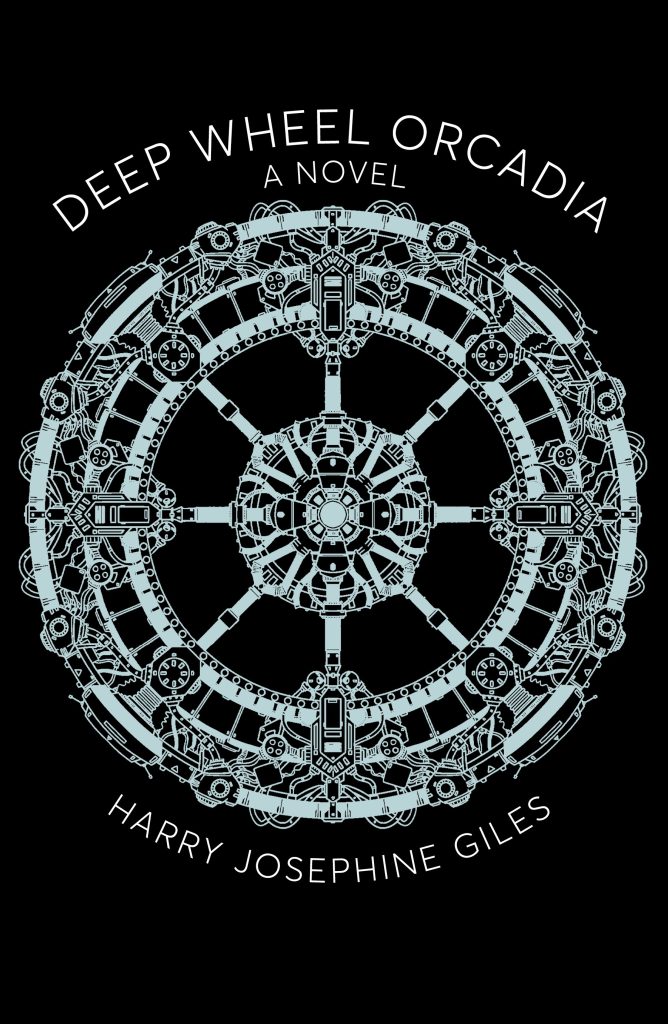Deep Wheel Orcadia
Harry Josephine Giles
(Picador, 2021); pbk, £10.99
If it is true that there’s nothing new under the sun, then Harry Josephine Giles has the ability to create an utterly convincing mirage of originality by crashing old ideas into each other. Whatever you think of Deep Wheel Orcadia, it would be difficult to argue that this work could have come from a mind other than theirs.
Deep Wheel Orcadia follows acclaimed work such as Drone, a multimedia performance told from the perspective of an anxious drone missile, as well as two collections of poetry. Written in the Orkney dialect with simultaneous translation in English, their first novel in verse is set on Orcadia, a remote space station with a few similarities to the Orkney we’re more familiar with. Orcadia’s inhabitants negotiate what it means to call such a small community home while maintaining a livelihood and reckoning with the wild unknown where scientific discovery can only reach so far.
Readers unfamiliar with the Orkney dialect face an interesting set of choices on how they approach this work. Do they start reading for the poetic cadence of the Orcadian sound, turn first to the English translation to understand the plot, or slow the reading down such that it is possible to take in both? There is no doubt that this novel is challenging reading—not least because the traditions of science fiction may yet pose another level of interpretation for some. But each tactic of entry into the text gives something different, and time spent digging brings up treasures.
The Orcadian stanzas are rhythmic, lilting and compact; an impressive achievement when considering how much they carry of plot and character. But the English translations too contain a different sort of poetics that ties itself to the uniqueness of dialect by gathering up the multiple meanings of each word into one combinatory English word, a translation technique borrowed from Rody Gorman, as Giles explains in the acknowledgements. This technique slows down the English reading, which some might find frustrating, but as an artistic decision the approach lends an integrity to the translation; a reminder that the true text cannot be reduced by direct translation.
A stanza within the first poem sees Astrid returning from four years at art college on Mars, unsure of how she might carry the new identities she’s gathered from her time away back into home life. It is as good as any example of the musicality in both expressions.
A peedie an weighty life on her back,
an whan sheu steps intae the airlock
sheu catches the grief o whit will come
if the pairts o her canno find thir piece.A little and heavymeaningful life on her back, and when she steps into the airlock, she begins to feel grief about what will happen if the parts of her can’t find their placedistancepartwhile.
Although less explicitly political than some of Giles’ earlier work, Deep Wheel Orcadia is allegorical, touching on the dangerous hubris of extractive capitalism and the precarity of those caught up in its inescapable logic. Here too are themes of cultural bleaching where old livelihoods fall away in the face of shinier, more lucrative trade further afield.
Harry Josephine Giles has always excelled at casting old themes in challenging and uncanny new lights, but what this unlikely creative project shows is that their success is due as much to getting the basics right as it is their surprising juxtapositions. Giles knows their characters well, skilfully inhabiting their doubt and faith, ambition and worry while situating this oh-so-human-frailty within a whirl of life that changes character and reader alike. Readers might come to this work for the weirdness, but it is the story that lingers.
Ellie Julings


Leave a Reply